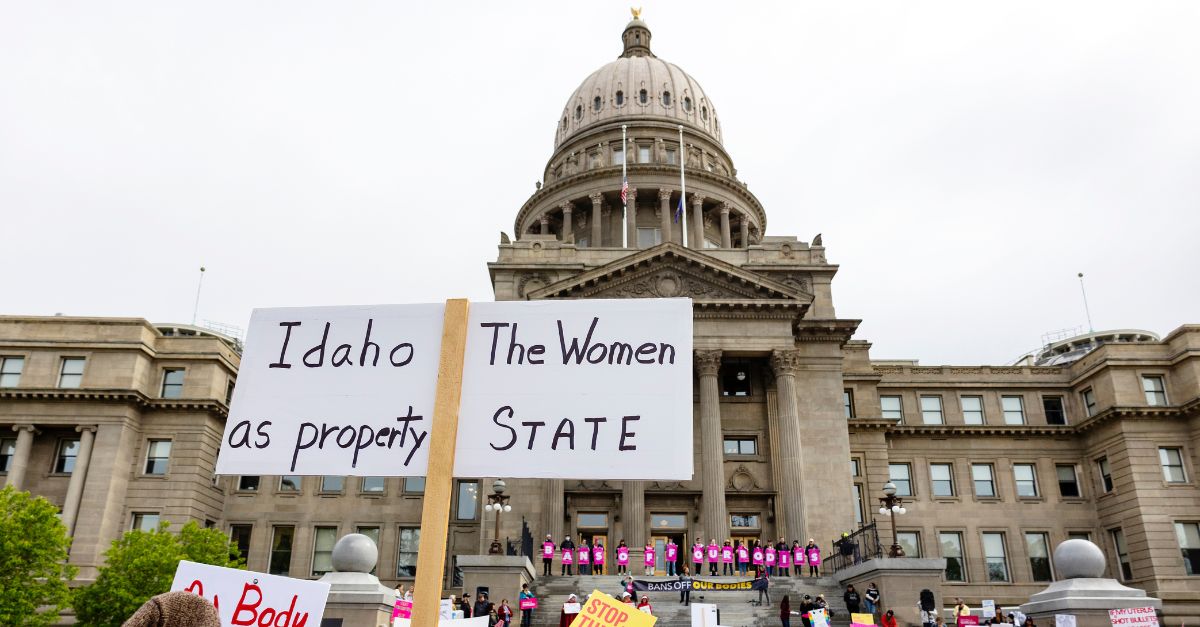
FILE – An attendee at Planned Parenthood’s Bans Off Our Bodies rally for abortion rights holds a sign reading outside of the Idaho Statehouse in downtown Boise, Idaho, on May 14, 2022 (Sarah A. Miller/Idaho Statesman via AP, File).
A federal appeals court substantially resurrected Idaho’s “abortion trafficking” law that makes it a crime to help a minor cross state lines for an abortion without parental consent.
In 2023, Idaho adopted HB 242, which created the crime of “abortion trafficking” as follows:
An adult who, with the intent to conceal an abortion from the parents or guardian of a pregnant, unemancipated minor, either procures an abortion, as described in section 18-604 Idaho Code, or obtains an abortion-inducing drug for the pregnant minor to use for an abortion by recruiting, harboring, or transporting the pregnant minor within this state commits the crime of abortion trafficking.
Idaho also prohibits nearly all abortions, with just a few narrow exceptions to save a mother’s life and for rape or incest that is reported to police. Washington, Oregon and Montana — states that border Idaho — all protect the right to have an abortion.
Lourdes Matsumoto, an attorney who works with victims of sexual violence, along with two advocacy groups, challenged the law on First Amendment grounds, arguing that it unduly limits free speech and association. In the lawsuit, Matsumoto named Idaho Attorney General Raúl Labrador as the sole defendant.
U.S. Magistrate Judge Debora Grasham ruled in November 2023 that the law indeed violates the First Amendment as an unconstitutional restriction on free speech. Grasham said that speaking, advocating, and fundraising to help individuals understand their reproductive options is “inherently protected speech,” and Grasham struck down the law as unconstitutionally vague.
Lawyers for the state of Idaho appealed Grasham’s ruling and argued that the law is not a restriction on speech, but rather, a prohibition against “strange adults” who are “recruiting, harboring or transporting” minors within the state to get an abortion.
A three-judge panel of the U.S. Court of Appeals for the Ninth Circuit presided over the case, which included U.S. Circuit Judges M. Margaret McKeown, a Bill Clinton appointee, John Owens, a Barack Obama appointee, and Carlos Bea, a George W. Bush appointee. The three circuit judges heard oral arguments in the case in May.
In a split ruling handed down Monday, McKeown wrote for the court in an opinion joined by Owens. The panel ordered that Grasham modify her preliminary injunction against the statute to block enforcement only of the “recruiting” prong of the statute.
McKeown wrote that the recruiting portion of the statute “is neither integral nor indispensable” to the operation of the statute as the legislature intended and can be severed from the rest of the statute.
“Without the ‘recruiting’ prong, the statute criminalizes ‘harboring’ or ‘transporting’ a minor to procure an abortion with the intent to conceal the abortion from the parents or guardian of the minor — an intelligible crime that reaches the problems the legislature sought to rectify,” McKeown wrote.
McKeown commented that encouragement, counseling and emotional support are protected speech and analogized, “If counseling those who are about to obtain abortions to instead carry their pregnancies to term is undoubtedly protected speech, then surely the opposite is true as well.”
The panel rejected the challengers’ argument that the statute violated their right to free association. McKeown wrote that the plaintiffs can still solicit donations and conduct “general advocacy” about the right to abortion in Idaho and elsewhere.
Bea concurred in the ruling, but dissented on the issue of standing. Bea said that the plaintiffs lacked standing because they essentially sued the wrong defendant. Bea said that as attorney general, Labrador is not the person who enforces the law in question, but rather, that county prosecutors do. Accordingly, said Bea, the plaintiffs’ injuries “are not traceable to the AG.”
Labrador hailed the ruling as “a tremendous victory for Idaho and defending the rule of law as written by the people’s representatives,” in a statement Monday.
“Trafficking a minor child for an abortion without parental consent puts both in grave danger, and we will not stop protecting life in Idaho,” Labrador said.
Since the Supreme Court’s ruling to overturn Roe v. Wade, several states, including Alabama and Tennessee, have adopted “abortion trafficking” statutes similar to Idaho’s law. In late September, a federal judge blocked Tennessee’s on First Amendment grounds for similar reasons as those the Idaho plaintiffs raised.
You can read the full ruling here.








